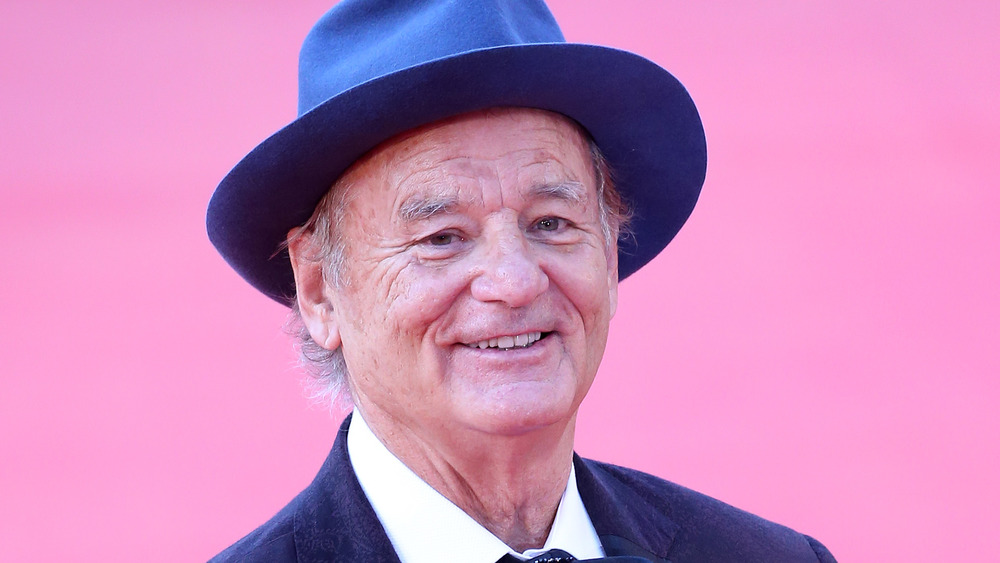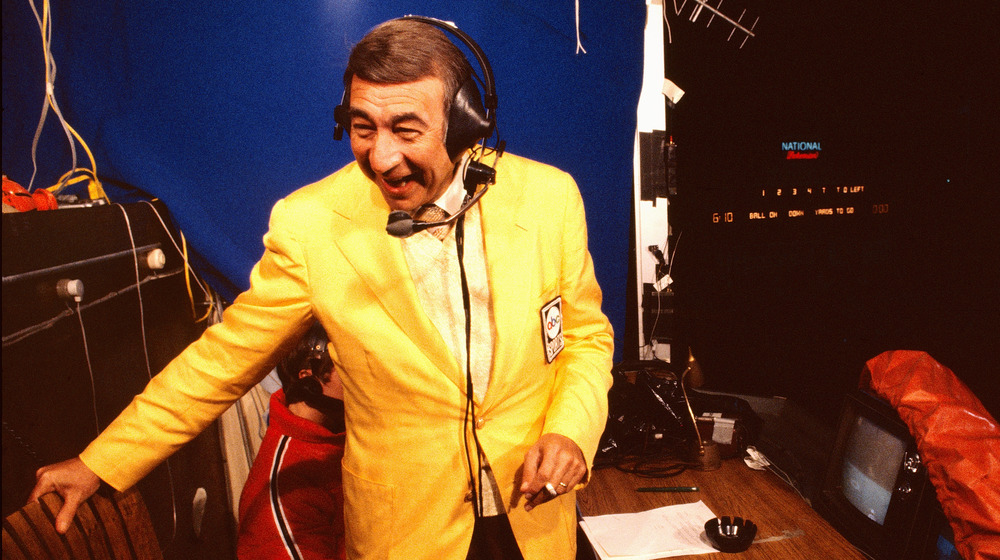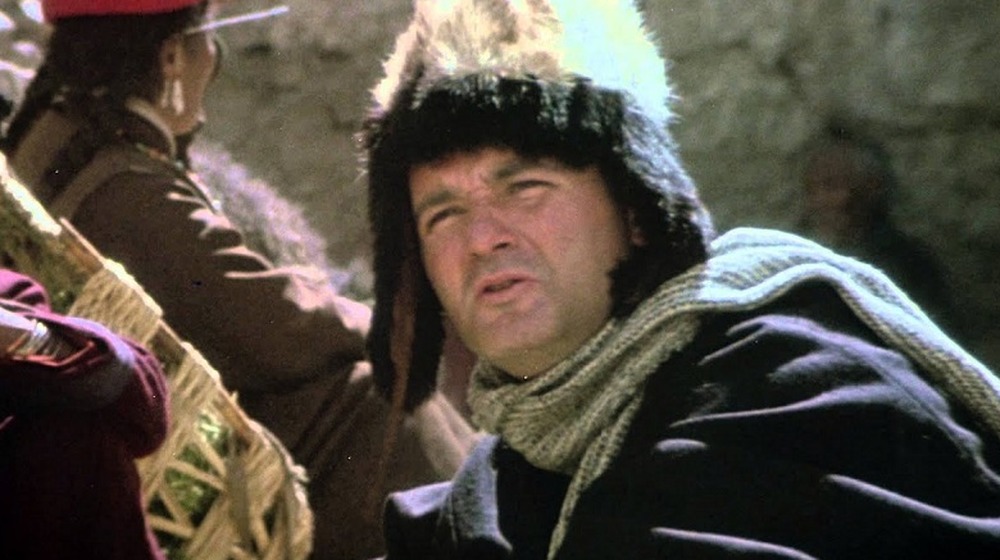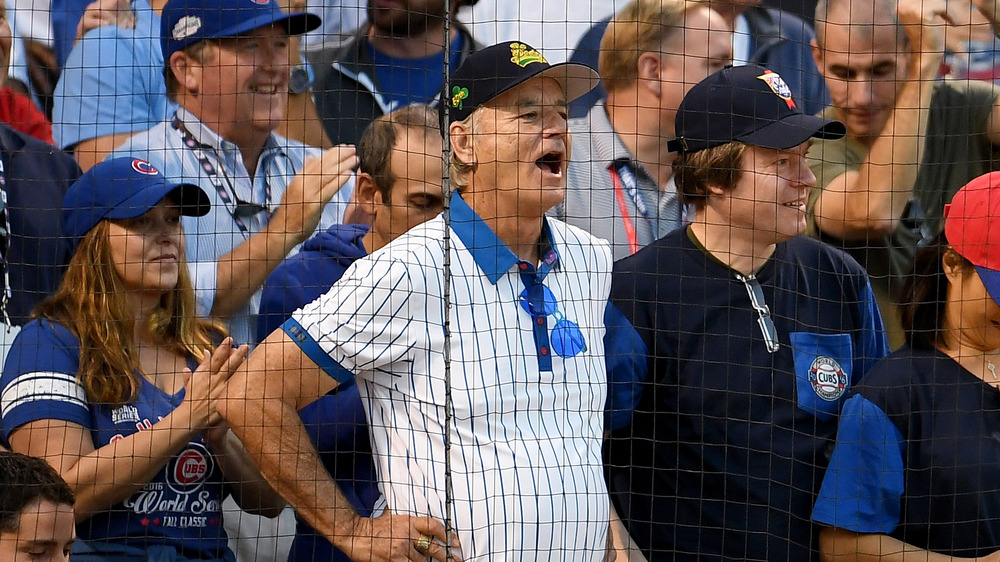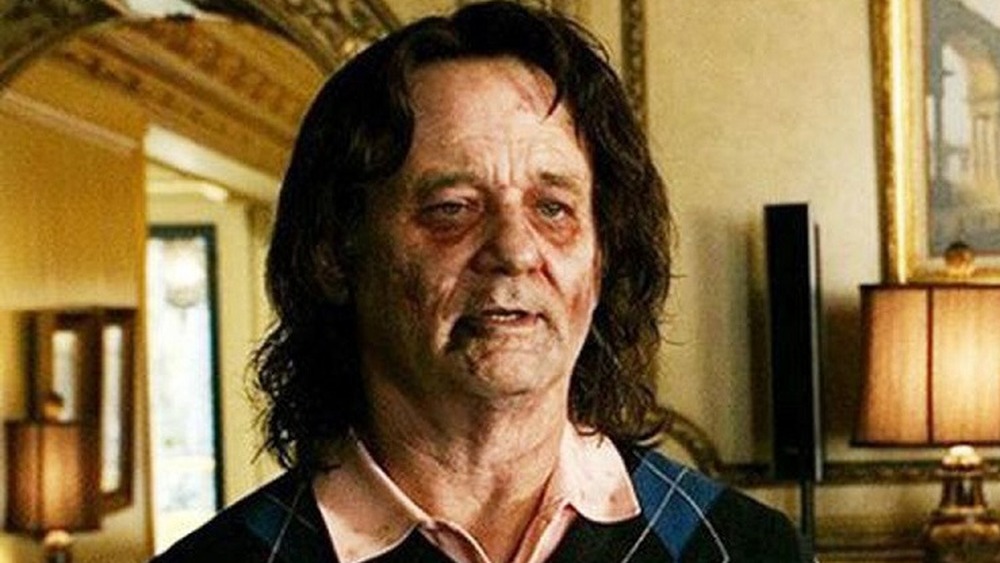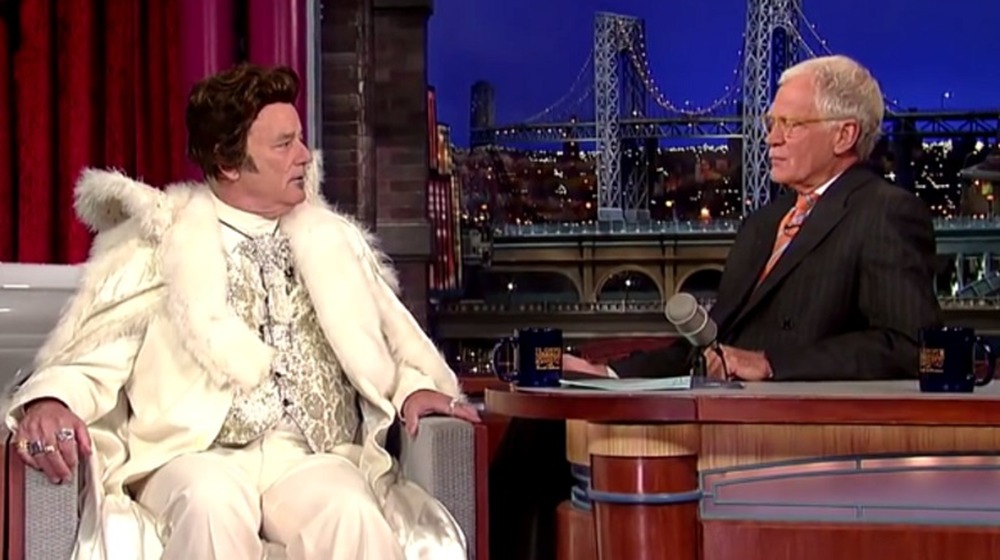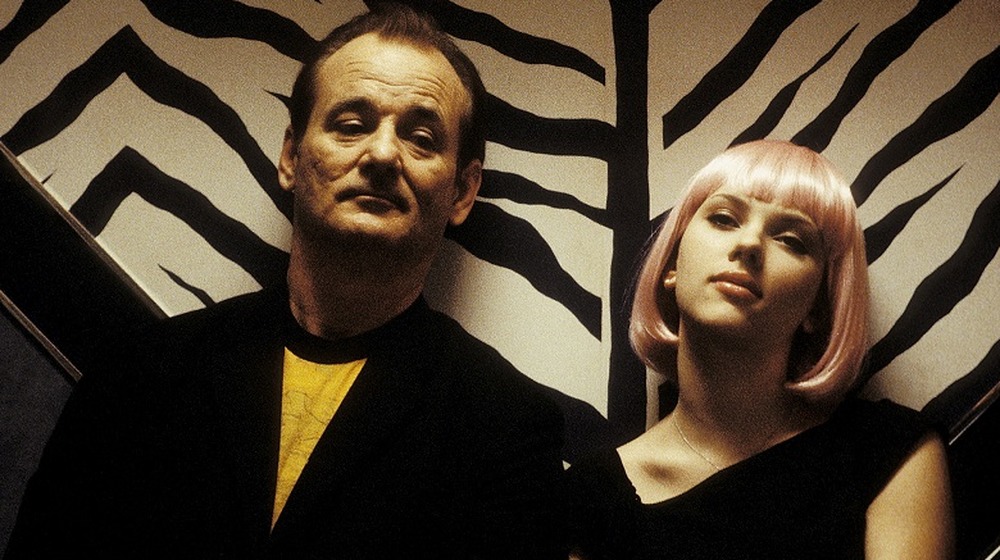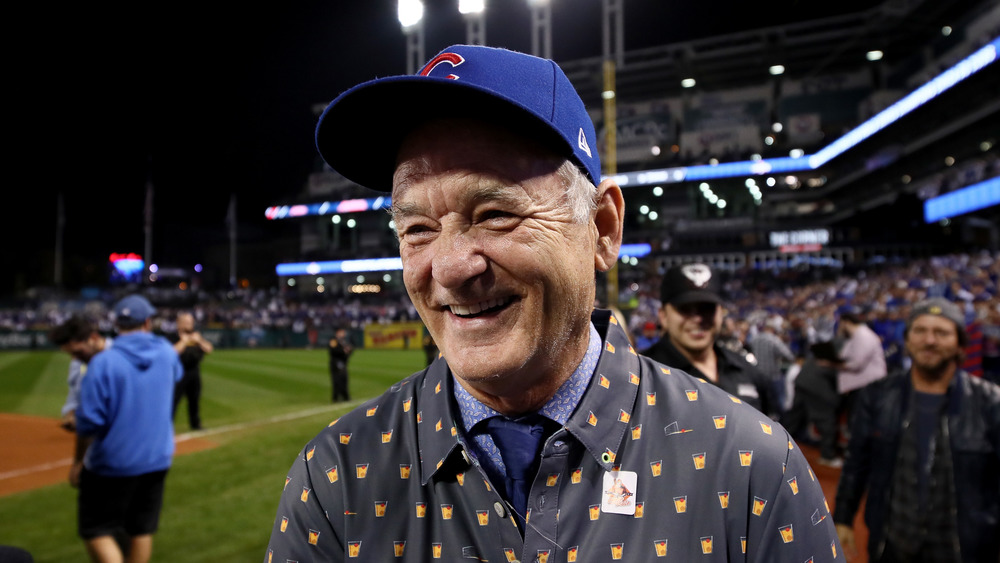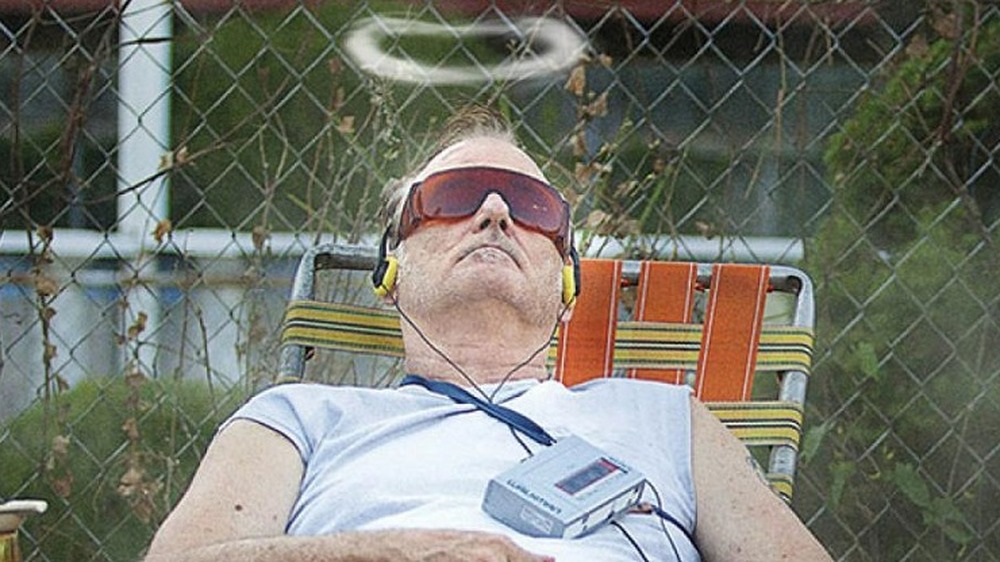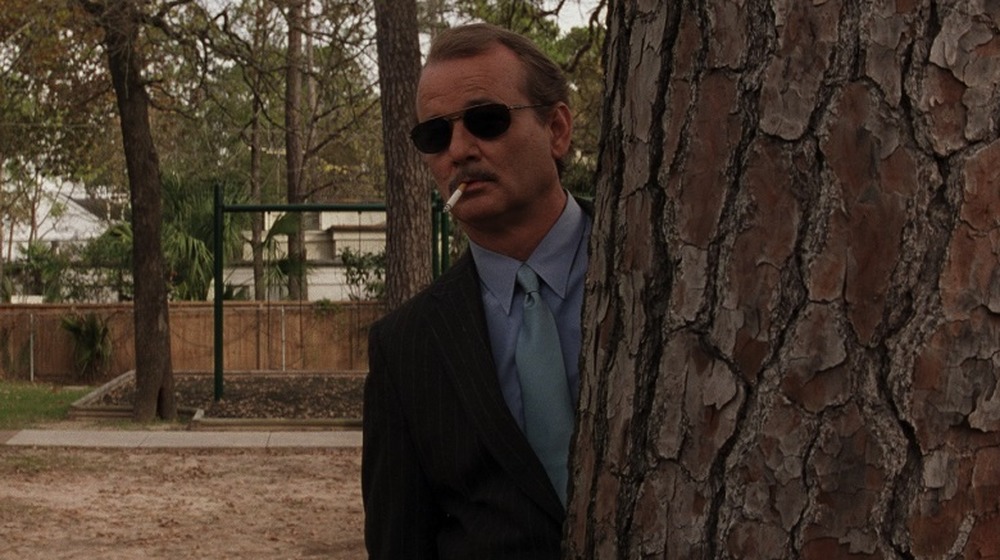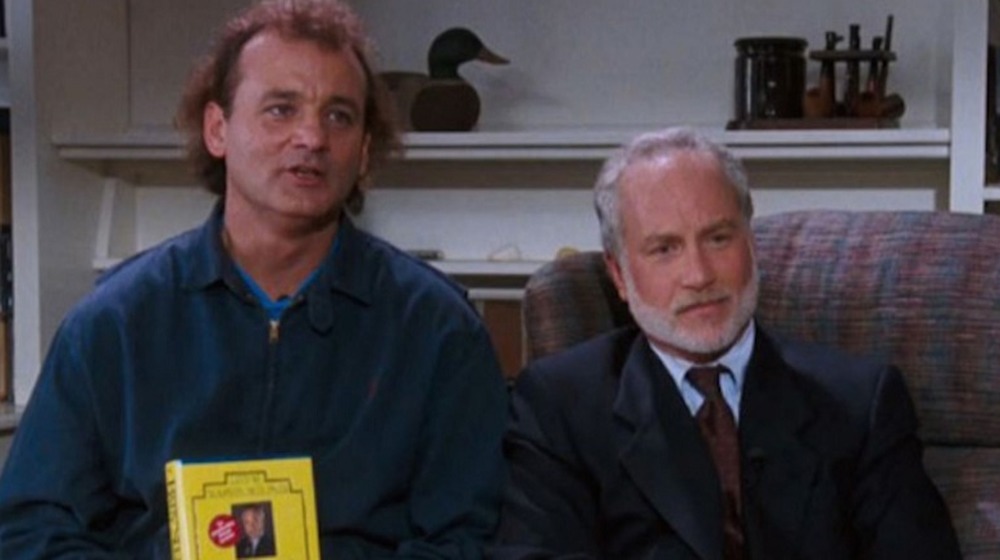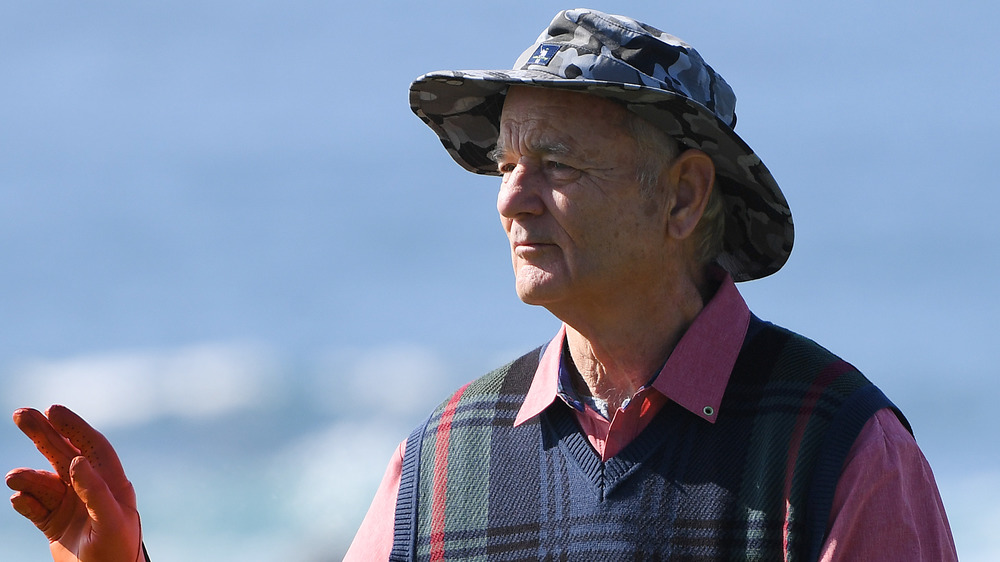The Untold Truth Of Bill Murray
Bill Murray might be one of the quirkiest film stars of all time. He's completely reinvented himself as an actor on multiple occasions, going from slapstick roles to drama to essentially playing himself. Because he doesn't live in Hollywood and doesn't have an agent, he can be impossible to locate unless he specifically wants to be found. However, he's far from a recluse, as he loves being in public and pranking fans.
Murray's uniqueness is multifaceted. He has studied philosophy and mysticism. He's an enthusiastic sports fan and an avid amateur golfer. He's close to his family, and has a number of businesses with them. He's an actor who works with the cream of the indie movie set, including directors like Sofia Coppola, Jim Jarmusch, and Wes Anderson, but he's also taken roles in films like Charlie's Angels and two different Garfield movies. The latter came about because he mistook the screenwriter of that film, Joel Cohen, for the masterful director Joel Coen. There's no one working in Hollywood quite like Bill Murray — and that's why fans love him.
He might be the star of Ghostbusters, Caddyshack, and Groundhog Day, but there's probably still a lot you don't know about this famous funnyman. Join us as explore the little-known details of Bill Murray's laugh-a-minute life.
Saturday Night Live ... with Howard Cosell?
Bill Murray's first role was on Saturday Night Live ... but not the one you're thinking of. This was 1975's Saturday Night Live With Howard Cosell. Improbably, journalist and sportscaster Cosell had become one of the world's biggest media stars. He became intensely popular not because he was loved, however, but because he was so good at playing the pompous villain. It wasn't all a show, either, as he defended controversial figures like Muhammad Ali (long before he was universally beloved), and was openly tired of sportscasters coddling athletes.
So his boss at Monday Night Football, Roone Arledge, developed a variety show for Cosell. The first episode featured Frank Sinatra, Ted Kennedy, and a performance from the cast of the smash Broadway musical The Wiz. It also featured tennis star Jimmy Connors singing to his then-girlfriend, Chris Evert, accompanied by Paul Anka on piano. A troupe of sketch comedy performers dubbed the Prime Time Players also made their debut. This group included Bill Murray, his brother Brian Doyle-Murray, Christopher Guest, and John Byner. The show was a huge flop, and was canceled after just 18 episodes, in part because it neutered Cosell's cruel spontaneity.
Over at NBC, a late-night show called NBC's Saturday Night debuted the same year. It dubbed its cast the Not Ready For Prime Time Players. NBC bought the rights to the name Saturday Night Live the next year, and the rest is history.
Bill Murray, Sorbonne student
In 1984, Murray was coming off a string of hits including Stripes, Caddyshack, and Tootsie. While his parts in these films are all ensemble roles, he steals the show in each of them. However, Murray felt like he was ready to do something different, and so he co-wrote a screenplay adaptation of W. Somerset Maugham's novel, The Razor's Edge. The story concerns an American soldier named Larry Darrell who travels to Europe and India to seek wisdom.
The film was a tough sell, and Dan Aykroyd suggested a trade: Columbia would give Murray the budget to make his movie, in exchange for being part of Ghostbusters. It worked, and Murray indeed went to India to make his movie, then came back to New York to film Ghostbusters. The mega-success of that film and the huge failure of The Razor's Edge left Murray disillusioned. Like Larry Darrell, his frustrations spurred him into leaving America.
Murray took his family and went to Paris. He lived the life of a student bohemian, studying French as well as philosophy at the famous Sorbonne. He was a devotee of the Russian philosopher and mystic George Gurdjieff, who brought Eastern ideas of consciousness and self-actualization to Europe. Murray drank at cafes where Ernest Hemingway hung out, ate chocolate and handed it out to strangers, and watched silent films at the Cinematheque. He spent a year in Paris, and didn't take on another starring role until 1988's Scrooged.
Bill Murray, man about town
Ever the comedian, Bill Murray delights in shocking strangers by crashing parties, photoshoots, and games. He's legendary for showing up and whispering "No one will ever believe you," typically after he's pulled a prank or otherwise surprised and delighted a random person. Currently living in Charleston, South Carolina, he's such a regular presence in the city that a Charleston insider blog ran a list of the best places to find him, which includes a restaurant he co-owns, the stadium of a baseball team he co-owns, and many notable local bars and restaurants. He even has a dish named after him at a local market. Locals recall him heckling a band at a venue and jokingly telling a restaurant hostess to get a haircut.
The documentary The Bill Murray Stories details a number of these encounters. He's read poetry to construction workers, did the dishes at a house party in Scotland, gave a Chicago Cubs World Series ticket to a random fan, tended bar (but only served tequila shots) in Austin, joined a private karaoke party, and crashed a kickball game. He's popped up at a birthday party and danced to tunes like "Turn Down For What." Once, Murray was in a cab and asked what else the driver did. When he replied that he played saxophone, Murray had them switch places, so the driver could play while he drove for him. They even stopped for barbecue along the way!
The scene-stealer
While Bill Murray has starred in many films, his smaller roles still manage to stand out within his filmography. In 1982's Tootsie, he played a straight man role as Dustin Hoffman's roommate. His stony reactions to the total craziness surrounding Hoffman's cross-dressing character add massively to the fun. In 1986's Little Shop Of Horrors, he played a masochistic dental patient who delights in sadistic dentist Steve Martin's torture.
Ed Wood sees Murray become Bunny Breckinridge, a member of Wood's troupe of actors who is also a drag queen. He devours the scenery every time he shows up. In Kingpin, he played the villainous bowling champion Eddie McCracken. His crazy hair is one of the highlights of his smarmy performance, and believe it or not, he actually bowled three straight strikes to close out the game, just as his character does.
Of course, Bill Murray's best role is always himself. In Space Jam, he annoys Larry Bird and Michael Jordan, asking if he can play in the NBA. Perhaps most memorably of all, Murray played himself in Zombieland, disguised in zombie makeup in order to get around Los Angeles undisturbed. His surprising death in a prank gone wrong is almost as fun a surprise as him popping up in the first place.
Bill Murray and David Letterman, friends forever
Bill Murray was the first guest on the first episode of NBC's Late Night With David Letterman in 1982. "If it's the last thing I'm gonna do," he vowed, "I'm gonna make every second of your life from this moment on a living hell." A star on the rise was a good get for Letterman's new show, and the duo's sarcastic personalities were a perfect match. These masters of cool irony set the tone for a new generation of comedy that skewered the cheesy variety show conventions of the past. Murray would go on to become the first guest on CBS' Late Show With David Letterman in 1993, and was the last guest in 2015.
Murray's entrances were especially memorable. On his first Late Show appearance, he ran in out of breath because he had gone to "the other place." For Letterman's 25th anniversary show, he came out in a tuxedo and top hat, brandishing champagne. He emerged in a fur parka and on crutches in another episode, claiming to have been injured in a skiing accident, and made Letterman sign his leg. After the New York Giants won the Super Bowl in 2012, Murray appeared in full uniform (though he oddly had his pads on over his jersey) and kicked a field goal outside.
On Letterman's last show, Murray stumbled out of a cake and gave Letterman a full-body, cake-covered hug. They later took swigs from a bottle of vodka.
Finding Bill for Lost in Translation
From the very beginning, director and screenwriter Sofia Coppola had only one man in mind for the role of aging actor Bob in her film Lost In Translation: Bill Murray. Based loosely on her own experience of isolation as the young wife of a celebrity photographer in Tokyo, the character of Charlotte (played by Scarlett Johansson) was easy for her to write. She wanted Murray because she knew his ability to improvise would serve her script perfectly, and she saw a sad sweetness in him she that wanted to bring out. Coppola specifically liked the idea of seeing him out of place.
Coppola pinned the entire film's production on being able to get him to star. As he famously works without an agent, she spent months trying to track him down before a mutual friend gave him a copy of the script. Murray called her one night and asked her to join him at dinner. They proceeded to spend five hours together. However, Murray still did not sign the contract.
Murray showed up a week before filming began. Coppola had already run up $1 million in pre-production costs. She said that when she was younger, she had been having a hard time, and "wished that Bill Murray would show up and take me on an adventure." She got her wish, as Murray gave her everything she wanted, including karaoke, improvisation with Japanese comedians, and a whole lot of riffing with Johansson.
Sweet Home Chicago
Bill Murray is a fan of most Chicago-area sports teams, but the Chicago Cubs have always been his truest love. He went to his first game when he was seven. As he recalled, "There was Wrigley Field, in green. There was this beautiful grass and this beautiful ivy. I'd only seen it in black and white. It was like I was a blind man made to see. It was something." When legendary Cubs announcer Harry Caray took a leave of absence in 1987, Murray took over for one game, openly jeering their opponents and claiming that Cubs pitcher Rick Sutcliffe owed him money.
During the Cubs' historic run to the World Series in 2016, Murray crashed a White House press conference to comment on the Cubs' chances. He did not correct a reporter who referred to him as "Mr. President." When the Cubs clinched the Series, Murray's expression was priceless. He "canceled" school in Chicago for the rest of the week, hung out in the clubhouse, and sipped champagne. Later that week, Murray attended a party with fellow Cubs fan Eddie Vedder and cheered for the Blackhawks, another Chicago team.
Murray is also a huge fan of the Chicago Bulls, and worked with Michael Jordan on Space Jam. He groused that despite having the game-winning steal and assist for the Toon Squad against the Monstars, he never got the credit he deserved: "I don't even get interviewed after." At least he'll always have the Cubs.
How to cast Bill Murray in your movie
Years ago, Murray fired his agents and manager. He was tired of calls coming to his house demanding his time, so he set up a 1-800 line where people can call and leave him messages. Of course, leaving a message is no guarantee that he'll call you back or even listen to it, as he goes weeks without checking messages. Most filmmakers seeking Murray's time have to get creative: Director Ted Melfi, for example, went through Murray's lawyer to cast him in St. Vincent. There are a few roles Murray auditioned for and didn't get: He was one of many who tried out for Han Solo in Star Wars. But, generally speaking, filmmakers have to come to him directly and pray for luck.
If Murray doesn't feel like taking a role, no matter how successful he thinks it might be, he turns it down. Sometimes it works out for another actor: He turned down Splash and did Ghostbusters instead, which was good for Tom Hanks' career. Murray also turned down the role Steve Carell made so memorable in Little Miss Sunshine. Imagining Murray in the many movies that have fruitlessly sought him is a fascinating exercise: Murray was wanted for Who Framed Roger Rabbit, Rain Man, and, amazingly, 1989's Batman, when a campy version of the character was being considered. When director Tim Burton got involved, he went with Michael Keaton instead. But just imagine: Bill Murray, Dark Knight of Gotham.
Wes Anderson's go-to guy
Since 1998, Murray has been a mainstay in Wes Anderson's films. Murray has proved that when he believes in a project, he backs it all the way: He accepted a scaled salary of $9,000 for Rushmore, his first film with Anderson. On top of that, he wrote a $25,000 check for a helicopter rental, in order to film a scene Disney refused to pony up for. Anderson never cashed it, but did keep it as a memento. He referred to Murray as the "godfather" of the film.
Murray's other starring role in an Anderson film came in The Life Aquatic With Steve Zissou. While the character is based on famous researcher Jacques Cousteau, Anderson noted that it was still very much Murray, saying, "Most of the time I just try to stand back and let him do what he does." Murray has a way of developing chemistry with many of Anderson's other actors: He and Gene Hackman grew close on The Royal Tenenbaums, the chemistry he has with Frances McDormand in Moonrise Kingdom is genuine, and he and George Clooney became pals while doing improvisational voice work for Fantastic Mr. Fox.
The Murricane
Ivan Reitman, director of Ghostbusters, has said that Murray's nickname, "The Murricane," sums him up perfectly, because he's "sort of a remarkable force of nature." Referring to Murray's tendency to not show up for projects till the last minute, he praised him for being so willing to make everyone else look good. Of course, co-star Annie Potts said, "I'm not sure he ever read the script. Maybe he gently looked at a page or two." When she tired of his constant improvising, she recalled saying, "Enough, Murray, enough."
These tendencies mean that Murray's had his share of disagreements with fellow actors. When Chevy Chase returned to host Saturday Night Live, Murray picked a fight with him. Chase told him that "his face looked like something Neil Armstrong landed on." He and Lucy Liu got into a big fight on the set of Charlie's Angels when she thought he was putting her down as an actress, leading to claims that she threw punches at him. Murray claimed that they made up, and that he didn't come back for the sequel because of someone else he didn't want to work with. He might've been referring to director McG, whom he said deserved to die by being "pierced with a lance." Most intriguingly, Murray's dynamic with Richard Dreyfuss in What About Bob? was fairly true to life, apparently. As Murray said, "I drove him nuts, and he encouraged me to drive him nuts."
Family business
Bill Murray is one of six brothers who grew up in Chicago loving sports, golf being a particular favorite. His older brother, the late Ed Murray, was the inspiration for the Danny Noonan character in Caddyshack, as Ed had won a scholarship working as a caddy. Brian Doyle-Murray co-wrote the screenplay to honor his brother, making the film a family affair.
The brothers opened a restaurant in St. Augustine inspired by the film, called Murray Bros. Caddyshack. Chef Andy Murray is the brains behind the operation, and it features items like the Caddy Shake, Carl's Crab Cakes, and The Divot. They often hold events in conjunction with the World Golf Village. A second location opened near Chicago in Rosemont in 2018: Its motto is "Eat, Drink, and be Murray."
Not content with golf-themed restaurants, the Murray brothers launched an entire line of golf apparel in 2020, hilariously dubbed the William Murray Collection. While it is a legitimate line of sportswear, it features shirts with characters from Murray's films, including one where Peter Venkman, Carl Spackler, and Steve Zissou team up to chase around the gopher from Caddyshack. The line also sells Spackler's bucket hat. It's a perfect blend of tongue-in-cheek humor and deadly seriousness, making it a fitting part of Murray's career.
